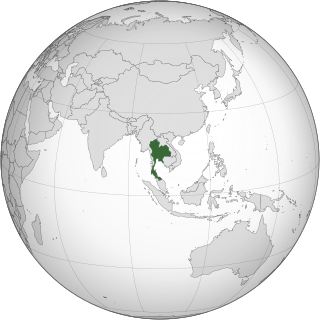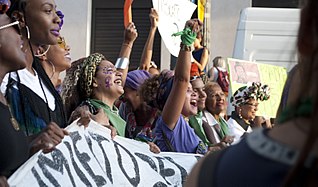Gender equality, also known as sexual equality or equality of the sexes, is the state of equal ease of access to resources and opportunities regardless of gender, including economic participation and decision-making; and the state of valuing different behaviors, aspirations and needs equally, regardless of gender.

The Convention on the Elimination of all Forms of Discrimination Against Women (CEDAW) is an international treaty adopted in 1979 by the United Nations General Assembly. Described as an international bill of rights for women, it was instituted on 3 September 1981 and has been ratified by 189 states. Over fifty countries that have ratified the convention have done so subject to certain declarations, reservations, and objections, including 38 countries who rejected the enforcement article 29, which addresses means of settlement for disputes concerning the interpretation or application of the convention. Australia's declaration noted the limitations on central government power resulting from its federal constitutional system. The United States and Palau have signed, but not ratified the treaty. The Holy See, Iran, Somalia, Sudan, and Tonga are not signatories to CEDAW.

Human rights in Uganda have trended for the past decades towards increasing harassment of the opposition, cracking down on NGOs which work on election and term limits, corruption, land rights, environmental issues, womens, children and gay rights. In 2012, the Relief Web sponsored Humanitarian Profile – 2012 said Uganda made considerable developments Since at least 2013 the Freedom in the World report by Freedom House has identified Uganda as a country considered to be "Not Free".There are several areas of concern when it comes to human rights in Uganda, and the "Not Free" classification is due to both low political rights and civil liberties rankings.

The Commission on the Status of Women is a functional commission of the United Nations Economic and Social Council (ECOSOC), one of the main UN organs within the United Nations. CSW has been described as the UN organ promoting gender equality and the empowerment of women. Every year, representatives of Member States gather at United Nations Headquarters in New York to evaluate progress gender equality, identify challenges, set global standards and formulate concrete policies to promote gender equality and advancement of women worldwide. In April 2017, ECOSOC elected 13 new members to CSW for a four-year term 2018–2022. One of the new members is Saudi Arabia, which has been criticised for its treatment of women.

Lesbian, gay, bisexual, and transgender (LGBT) people in Thailand have several but not all of the same rights as non-LGBT people. Both male and female types of same-sex sexual activity are legal in Thailand, and same-sex marriage rights within the nation are pending legalisation. About eight percent of the Thai population, five million people, are thought to be in the LGBT demographic.
A human rights defender or human rights activist is a person who, individually or with others, acts to promote or protect human rights. They can be journalists, environmentalists, whistleblowers, trade unionists, lawyers, teachers, housing campaigners, participants in direct action, or just individuals acting alone. They can defend rights as part of their jobs or in a voluntary capacity. As a result of their activities, human rights defenders (HRDs) are often subjected to reprisals including smears, surveillance, harassment, false charges, arbitrary detention, restrictions on the right to freedom of association, physical attack, and even murder. In 2020, at least 331 HRDs were murdered in 25 countries. The international community and some national governments have attempted to respond to this violence through various protections, but violence against HRDs continues to rise. Women human rights defenders and environmental human rights defenders face greater repression and risks than human rights defenders working on other issues.

Discussions of LGBT rights at the United Nations have included resolutions and joint statements in the United Nations General Assembly and the United Nations Human Rights Council (UNHRC), attention to the expert-led human rights mechanisms, as well as by the UN Agencies.
The Declaration on the Elimination of Violence Against Women was adopted without a vote by the United Nations General Assembly in the 48/104 resolution of 20 December 1993. Contained within it is the recognition of "the urgent need for the universal application to women of the rights and principles with regard to equality, security, liberty, integrity and dignity of all human beings". It recalls and embodies the same rights and principles as those enshrined in such instruments as the Universal Declaration of Human Rights, and Articles 1 and 2 provide the most widely used definition of violence against women.
Mary Shanthi Dairiam is a Malaysian human rights and women's rights advocate. She was the elected member from Malaysia to the Committee on the Elimination of All Forms of Discrimination against Women serving the Committee from 2005 - 2008.

Human rights in South Sudan are a contentious issue, owing at least in part to the country's violent history.

The International Convention on the Elimination of All Forms of Racial Discrimination (ICERD) is a United Nations convention. A third-generation human rights instrument, the Convention commits its members to the elimination of racial discrimination and the promotion of understanding among all races. The Convention also requires its parties to criminalize hate speech and criminalize membership in racist organizations.

Maina Kiai is a Kenyan lawyer and human rights activist who formerly served as the United Nations Special Rapporteur on the rights to freedom of peaceful assembly and of association from May 1, 2011, to April 30, 2017. Since 2018, he has headed Human Rights Watch's Alliances and Partnerships program.

The Office of the Special Representative of the Secretary-General on Sexual Violence in Conflict (OSRSG-SVC) is an office of the United Nations Secretariat tasked with serving the United Nations' spokesperson and political advocate on conflict-related sexual violence, the Special Representative of the Secretary-General on Sexual Violence in Conflict (SRSG-SVC). The Special Representative holds the rank of Under-Secretary-General of the UN and chairs the UN Action Against Sexual Violence in Conflict. The mandate of the SRSG-SVC was established by Security Council Resolution 1888, introduced by Hillary Clinton, and the first Special Representative, Margot Wallström, took office in 2010. The current Special Representative is Pramila Patten of Mauritius, who was appointed by UN Secretary General António Guterres in 2017. The work of the SRSG-SVC is supported by the UN Team of Experts on the Rule of Law/Sexual Violence in Conflict, co-led by the Department of Peacekeeping Operations (DPO), Office of the High Commissioner for Human Rights (OHCHR) and the UN Development Programme (UNDP), also established under Security Council Resolution 1888.

Victor Madrigal-Borloz is a Costa Rican lawyer. Since 2018, he has served as the United Nations Independent Experton protection against violence and discrimination based on sexual orientation and gender identity . During his tenure at the U.N., Madrigal-Borloz has been noted for focusing his Human Rights Council mandate on investigating a broad and intersectional range of issues facing LGBT communities around the world, including conversion therapy, criminalization, socio-cultural exclusion, anti-trans rhetoric, and the outsized impact of the COVID-19 pandemic on vulnerable LGBT and gender-diverse populations.

This article provides an overview of marital rape laws by country.

Basic human rights in Italy includes freedom of belief and faith, the right of asylum from undemocratic countries, the right to work, and the right of dignity and equality before the law. Human rights are the basic rights of every citizen in every country. In Italy, human rights have developed over many years and Italy has education on human rights. In addition, Italy has specific human rights for women, children and LGBT people.

Portugal is generally considered as successful in upholding the civil liberties and protecting the human rights of its citizens. Portugal has proved to be determined in promoting and respecting human rights at an international and national level. The country's minister of Justice as of September 2018, Francisca Van Dunem, said that Portugal has had "a good track record" on human rights but violations still do persist.
The United Nations Independent Expert on protection against violence and discrimination based on sexual orientation and gender identity is a United Nations Independent Expert appointed by the body's Human Rights Council under its special procedures mechanism. The Independent Expert's Mandate is to examine, monitor, advise, and publicly report on matters related to human rights violations based on sexual orientation and gender identity.
The Declaration on the Rights of Peasants is an UNGA resolution on human rights with "universal understanding", adopted by the United Nations in 2018. The resolution was passed by a vote of 121-8, with 54 members abstaining.

The International Day of Black Latin American and Caribbean Women, shortly known as B.L.A.C Women's Day, also known as the International Afro-Latin American, Afro-Caribbean and Diaspora Women's Day and International Afro-descendant Women's Day, is linked to Afrofeminism movement and the broader recognition of the African diaspora and the rights of people of African descent that observed on 25 July since 1992.













